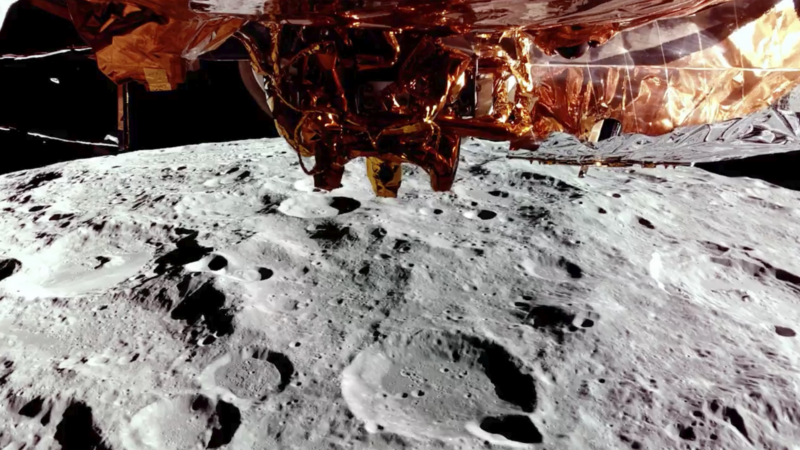Private lunar lander Blue Ghost touches down on the moon
CAPE CANAVERAL, Fla. — A private lunar lander carrying a drill, vacuum and other experiments for NASA touched down on the moon Sunday, the latest in a string of companies looking to kickstart business on Earth’s celestial neighbor ahead of astronaut missions.
Firefly Aerospace’s Blue Ghost lander descended from lunar orbit on autopilot, aiming for the slopes of an ancient volcanic dome in an impact basin on the moon’s northeastern edge of the near side.
Confirmation of successful touchdown came from the company’s Mission Control outside Austin, Texas, following the action some 225,000 miles (360,000 kilometers) away.
“You all stuck the landing. We’re on the moon,” Firefly’s Will Coogan, chief engineer for the lander, reported.
An upright and stable landing makes Firefly — a startup founded a decade ago — the first private outfit to put a spacecraft on the moon without crashing or falling over. Even countries have faltered, with only five claiming success: Russia, the U.S., China, India and Japan.
A half hour after landing, Blue Ghost started to send back pictures from the surface, the first one a selfie somewhat obscured by the sun’s glare.

Two other companies’ landers are hot on Blue Ghost’s heels, with the next one expected to join it on the moon later this week.
Blue Ghost — named after a rare U.S. species of fireflies — had its size and shape going for it. The squat four-legged lander stands 6-foot-6 (2 meters) tall and 11 feet (3.5 meters) wide, providing extra stability, according to the company.
Launched in mid-January from Florida, the lander carried 10 experiments to the moon for NASA. The space agency paid $101 million for the delivery, plus $44 million for the science and tech on board. It’s the third mission under NASA’s commercial lunar delivery program, intended to ignite a lunar economy of competing private businesses while scouting around before astronauts show up later this decade.
The demos should get two weeks of run time, before lunar daytime ends and the lander shuts down.
It carried a vacuum to suck up moon dirt for analysis and a drill to measure temperature as deep as 10 feet (3 meters) below the surface. Also on board: a device for eliminating abrasive lunar dust — a scourge for NASA’s long-ago Apollo moonwalkers, who got it caked all over their spacesuits and equipment.
On its way to the moon, Blue Ghost beamed back exquisite pictures of the home planet. The lander continued to stun once in orbit around the moon, with detailed shots of the moon’s gray pockmarked surface. At the same time, an on-board receiver tracked and acquired signals from the U.S. GPS and European Galileo constellations, an encouraging step forward in navigation for future explorers.
The landing set the stage for a fresh crush of visitors angling for a piece of lunar business.

Another lander — a tall and skinny 15-footer (4 meters tall) built and operated by Houston-based Intuitive Machines — is due to land on the moon Thursday. It’s aiming for the bottom of the moon, just 100 miles (160 kilometers) from the south pole. That’s closer to the pole than the company got last year with its first lander, which broke a leg and tipped over.
Despite the tumble, Intuitive Machines’ lander put the U.S. back on the moon for the first time since NASA astronauts closed out the Apollo program in 1972.
A third lander from the Japanese company ispace is still three months from landing. It shared a rocket ride with Blue Ghost from Cape Canaveral on Jan. 15, taking a longer, windier route. Like Intuitive Machines, ispace is also attempting to land on the moon for the second time. Its first lander crashed in 2023.
The moon is littered with wreckage not only from ispace, but dozens of other failed attempts over the decades.
NASA wants to keep up a pace of two private lunar landers a year, realizing some missions will fail, said the space agency’s top science officer Nicky Fox.
Unlike NASA’s successful Apollo moon landings that had billions of dollars behind them and ace astronauts at the helm, private companies operate on a limited budget with robotic craft that must land on their own, said Firefly CEO Jason Kim.
Kim said everything went like clockwork.
“We got some moon dust on our boots,” Kim said.
Taiwan’s president pledges to defend island’s sovereignty after Chinese military drills
Taiwanese President Lai Ching-te vowed to defend the self-ruled island's sovereignty in the face of what he termed China's "expansionist ambitions," days after Beijing wrapped up live-fire military drills near its shores.
Deaths reported during widening protests in Iran sparked by ailing economy
The protests began due to economic pressures, with Iran's currency rapidly depreciating. Demonstrators have also chanted against the country's theocracy.
Congress failed to extend Obamacare subsidies. This Democrat says Trump can save them
Sen. Peter Welch, D-Vt., says he thinks the Senate can pass a "retroactive" Affordable Care Act subsidy extension, but "we need President Trump."
Rideshare union rights, social media limits and other state laws taking effect Jan. 1
Every new year, public media reporters across the country bring us some of the new state laws taking effect where they are. Here are six in 2026.
Guides to help you tackle your New Year’s resolutions
From building your strength to tackling credit card debt, NPR's Life Kit has a newsletter journey to help you tackle your New Year's resolution.
Guides to help you tackle your New Year’s resolutions
From building your strength to tackling credit card debt, NPR's Life Kit has a newsletter journey to help you tackle your New Year's resolution.






